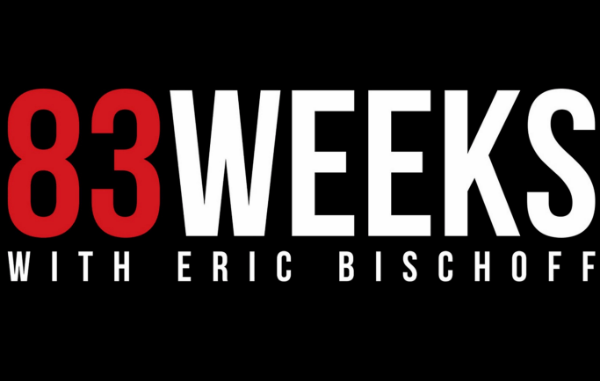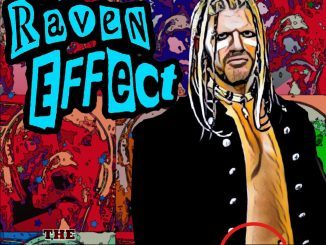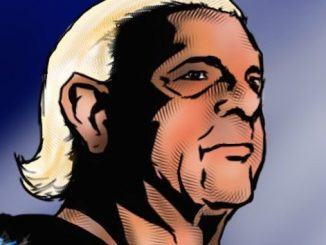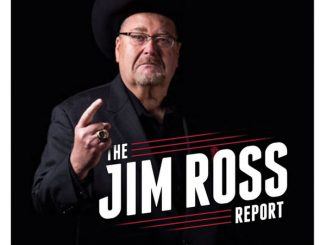
83 Weeks – Eric Bischoff’s First Year in WWE
Release date: November 19, 2018
Recap by: Caitlin Lavelle
DIRECT LINK TO LISTEN/DOWNLOAD
Last week, Eric & Conrad Thompson dissected Eric’s WWE debut. In this episode, they break down the rest of Eric’s first year (and some change) in the company as Raw’s on-screen General Manager.
Stephanie McMahon
Eric talks about immediately working with Stephanie McMahon, who he says was “still green” on camera, after starting at WWE. Eric says this pairing was a natural fit due to his history with the McMahon family.
Conrad asks Eric about the two on-screen kisses he had with Stephanie, and Eric says Stephanie was, “game for anything,” and didn’t have the “not right for my character,” attitude. He says it was a bit awkward making out with Stephanie when he was dressed as Vince McMahon during RAW’s Halloween episode, especially since Vince was right off camera, directing the scene. However, Eric says this was shot live, and that he could hear the thunderous crowd reaction in the arena. He thought the segment would lead in a great direction from a creative standpoint, and was disappointed when the angle was essentially dropped and forgotten.
Triple H & The Brand Split
Eric admits that he, “never felt a connection with Hunter on-camera,” in WWE.
Eric remembers working with Triple H in WCW, and says Hunter’s biggest downside at that time was the fact that he lived in the Northeast and was expensive to fly into Atlanta for television tapings.
Eric says Triple H didn’t have a big personality in WCW, but was a solid worker. Bischoff says the only time he remembers socializing with Hunter was at Diamond Dallas Page’s Christmas party. He says Hunter was friendly and cordial, but always professional and not, “one of the boys,” which Eric clarifies is meant as a compliment.
Eric talks about the on-screen fight between Raw and Smackdown to sign Triple H to their respective brands, reintroducing the WCW World Championship Belt and anointing Triple H with the title.
In retrospect, Eric says he thinks the brand split didn’t work because WWE wasn’t willing to go all the way with it, calling the concept a diluted idea. Eric believes introducing a new belt should have been a bigger moment that created a more divisive environment, but this was instead done in what Bischoff calls a, “throwaway segment.”
Kevin Dunn
Eric calls Dunn, “short on personality and charisma, long on talent.” He says Dunn never struck him as negative, just very indifferent, but that, after getting to know him, Eric realized Kevin treated everyone that same way. He says Kevin is, “an aloof, indifferent cat.”
Eric says Kevin Dunn was all business and wouldn’t say much to you at TV tapings, but that he was more relaxed after-hours at the hotel bar, and socialized with Jonathon Coachman and Mean Gene.
Eric’s Martial Arts Background
Conrad asks Eric about his background in martial arts. Eric says he got into martial arts as a kid through a neighbor, who was a black belt that mentored Eric. Eric says he took Karate until he was about 15-years-old, then stopped, then got back into the sport in his early twenties, becoming a black belt sometime around 1976.
Eric says he began competing in pay-to-enter tournaments, where he had fun and actually met Sunny Onoo for the first time. Eric says he was pretty good, and would typically place in the top three in national tournaments, but that he wasn’t the best. Bischoff says he had a couple of professional fights in small venues, including a couple of bouts on ESPN, but says it, “wasn’t a big deal.”
The Billy & Chuck Wedding
Eric and Conrad discuss Eric’s role in the Billy Gunn & Chuck Palumbo wedding segment, were an unrecognizable Bischoff donned a prosthetic disguise, posed as the priest officiating the wedding, and ultimately revealed his identity to an unsuspecting audience.
Eric says he knew about his participation in the wedding about a month out, and that WWE flew him to the top makeup studio in Los Angeles to be fitted for a prosthetic mask for the segment. He says he flew to Minneapolis, the sight of the wedding, the night before SmackDown, and was asked to come to the building by 9 a.m. instead of his normal call time of noon.
Eric explains that it took four hours for a special makeup artist who WWE flew in to apply Eric’s mask in a secluded, off-limits room at the venue. Once he saw the completed look, Eric said he knew he wanted to act like an 80-year-old man, and created a character inspired by both Jim Barnett & Eric’s own father, who Eric says had to have brain surgery as a result of complications from being born prematurely in the 1930’s.
Eric says he walked around backstage in his prosthetic before the show and tried out his character on as many people as he could, approaching about half a dozen people (including Eddie Guerrero, whom he asked for whisky). Eric says no one suspected his true identity, which made him extremely confident in the character.
Eric calls his reveal at the Billy & Chuck wedding, “the most fun thing I’ve ever done in the ring,” and describes having a “magical feeling,” when he shocked the Minneapolis audience. He says he doesn’t agree with the negative reaction some critics had to the controversial angle, and says Billy & Chuck, “didn’t demean anyone and wasn’t intended to do that,” continuing, “If anyone was offended by it, it was because they wanted to be offended by it, and I don’t care.”
WWE’s Creative Process & Vince McMahon
Eric talks about shifting gears from his creative role at WCW to strictly performing at WWE. He calls WWE’s creative process “less transparent” than WCW’s, and says he often had no idea who came up with what angle at WWE.
Eric says he didn’t want to be overly involved with creative or politics at WWE, and that he just wanted to show up and do his job.
Eric says he was somewhat uncomfortable with a few of the things that we was asked to do in WWE, like when a ‘HLA’ (Hot Lesbian Action) segment turned into a vicious intergender beat down by 3 Minute Warning, but calls this sophomoric humor a “hangover from the Attitude era,” that was indicative of the sense of humor of the WWE’s writing team.
Eric ballparks that he probably only spoke to Vince McMahon for a totality of 15 minutes during this first year in WWE, but he believes Vince likes to push performers out of their comfort zone because he thinks it makes good TV and wants to see who is really committed to their character.
Side Projects with Mark Burnett & Joe Francis
Eric says he was pitching a martial arts competition elimination show to famous reality TV producer Mark Burnett during this time. He says Burnett was, “very into all things physical and loved wrestling,” but that they ultimately couldn’t find a network for the show.
Eric also talks about his relationship with Joe Francis, of Girls Gone Wild fame, and calls Francis one of the first people to effectively monetize the subscription model (where people would enroll in a monthly billing service and neglect to unsubscribe). Bischoff says Francis wanted to do a pay-per-view and enlisted Eric’s help.
Eric says Francis wanted to buy Playboy, and that there were rumors around this time that McMahon was also interested in purchasing Playboy, so Eric introduced the two parties in an effort to help make the deal happen.
Elimination Chamber
Eric talks about the first Elimination Chamber match on Survivor Series 2002, and says he was not impressed with the concept. He says he immediately thought the big, heavy, dark structure would be difficult to make look good on TV, and that the gimmick of the match didn’t resonate with him.
Stone Cold Steve Austin
Eric talks about shooting the ‘search for Steve Austin’ angle throughout bars in small-town Texas. He says he was approached by Bruce Prichard, who produced those segments, a few weeks prior to filming to ask if Eric was alright with working with Austin, and Eric says he had no issues and thought it would be great.
Bischoff says seeing Austin on the day of shooting at the bar was the first time the two had been face-to-face in nearly a decade, since before Bischoff had fired Austin from WCW via FedEx.
Eric says Steve pulled him aside and asked to talk. He says Steve grabbed them a couple of beers and made it clear that their past was water under the bridge and that there were no hard feelings. Eric says that from that moment on and to this day, the he and Austin have been friends.
Eric talks working a match with Steve Austin, who he says was suffering from severe neck, back and leg issues, at No Way Out. Bischoff says he was concerned he might mess up and so something to hurt Austin by accident, and that he didn’t want to be known as, “the guy who hurt Steve Austin.”
Ric Flair
Conrad asks Eric about a story in Ric Flair’s book, where Ric talks about confronting Eric backstage at WWE in March 2003, slapping Eric and swinging at him multiple times, and pushing a finger into Bischoff’s eye while yelling that he, “could take his f—–g eye out right now!”
Eric says he was in his phone in a room speaking to his wife and attorney, and that Ric burst into the room with Arn Anderson and Jonathon Coachman. He says Ric asked him to get off the phone, but Eric thought Ric might have been joking. Eric says Ric started throwing punches at him, but that none of them connected, even though Bischoff was seated.
Eric says Ric was visibly upset, so much so that Ric bit his own lip and was bleeding from the mouth. Eric says he told Ric he wasn’t going to fight him and kept asking what was going on. Eric said he was confused and wondered whether he was filming a scene that someone forgot to tell him about.
Eric says Ric eventually got Eric’s back against the wall and that Sargent Slaughter came in and broke up the fight. Eric says Arn Anderson said and did nothing, an that he, “lost a lot of respect for Arn that day.”
Eric says he didn’t want Vince McMahon to find out by word-of-mouth, so he immediately found Vince and gave him his account of what had just happened. Eric said he told Vince he was fine with Ric and had no issues, and had no interest or intention of fighting with Flair. He says he wanted Vince to know he didn’t provoke Ric.
Eric says Vince asked him if he was okay, then told him he would look into it.
Goldberg
Eric says he and Goldberg, “had their moments” of contention towards the end of WCW, and that they were, “less than friends,” and on opposite ends of the equation at the time. However, Eric says that by the time they were both in WWE, Goldberg knew Eric was, “one of the only friendly faces he could trust.”
Eric’s First Year in WWE in Review
Overall, Eric says he enjoyed his first year with WWE. He says he had fun barring a few lowpoints, including his altercation with Ric Flair and a stinkface from Rikishi. Eric says when he hung up after his first phonecall from Vince asking him to join WWE, he was confident, but didn’t honestly think he would last 6 months in the company. Eric says he never thought he would be with WWE for 4 or 5 years.
Rating: 6/10
Barring a few novel stories and clever witticisms, this is a long and often tedious review of Eric’s first year in WWE, especially compared to last week’s snappy and compelling account of Eric’s WWE debut.
Writer Bio
Caitlin is a wrestling fan who hopes to one day discover that she is the illegitimate daughter of Vincent Kennedy McMahon and the rightful Anonymous RAW General Manager. Until then, she’ll keep on living in Orlando, Florida with her husband and son.




Be the first to comment